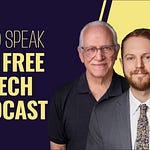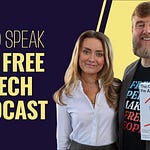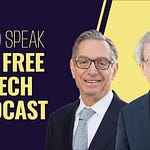Shapiro shares his firsthand experience with cancel culture and how the American Bar Association’s policies influence legal education. He also opines on major free speech cases before the Supreme Court, including the TikTok ownership battle and Texas’ age verification law for adult content.
Shapiro is a senior fellow and director of constitutional studies at the Manhattan Institute. He previously (and briefly) served as executive director and senior lecturer at the Georgetown Center for the Constitution and as a vice president at the Cato Institute. His latest book, “Lawless: The Miseducation of America’s Elites,” is out now.
Enjoy listening to our podcast? Donate to FIRE today and get exclusive content like member webinars, special episodes, and more. If you became a FIRE Member through a donation to FIRE at thefire.org and would like access to Substack’s paid subscriber podcast feed, please email sotospeak@thefire.org.
Timestamps:
00:00 Intro
02:58 Shapiro’s Georgetown controversy
15:07 Free speech on campus
26:51 Law schools’ decline
40:47 Legal profession challenges
42:33 The “vibe shift” away from cancel culture
56:02 TikTok and age verification at the Supreme Court
01:03:37 Anti-Semitism on campus
01:09:36 Outro
Show notes:
“The illiberal takeover of law schools” City Journal (2022)
“Poll finds sharp partisan divisions on the impact of a Black woman justice.” ABC News (2022)
“Why I quit Georgetown.” Ilya Shapiro, The Wall Street Journal (2022)
“Georgetown’s investigation of a single tweet taking longer than 12 round-trips to the moon.” FIRE (2022)
Lamont v. Postmaster General (1965)
TikTok Inc v. Garland (2025)
Ginsberg v. New York (1968)
International Holocaust Remembrance Alliance (IHRA) working definition of antisemitism (last updated 2025)
Editor's note: This abridged transcript highlights key discussions from the podcast. It has been lightly edited for length and clarity. Please reference the full unedited transcript for direct quotes.
On being born in the Soviet Union, growing up in Canada, and moving to America
NICO PERRINO, HOST: Why did you decide to go into law?
ILYA SHAPIRO, GUEST: I was born in the Soviet Union in Moscow. My parents got me out as soon as they could. I was four when we came to Canada, growing up around Toronto. I was always interested in legal political institutions, which is a nerdy and precocious thing, but there it is.
PERRINO: Did it have anything to do with the family history?
SHAPIRO: Absolutely. My parents taught me that communism was bad. My family history includes my dad’s dad being arrested by Stalin’s secret police. Then he and his mom were exiled to Siberia. All of these things were not atypical of the Soviet period and especially of Soviet Jewry. We were able to get out because Brezhnev was letting Jews go to Israel in the late ‘70s, early ‘80s and we got a visa that way. I didn’t end up going to Israel, I ended up going to Canada, the first country that gave us a visa. So, growing up, I had this interest in why some countries are good, some are bad, all these kinds of governments.
Also very early on, I began to prefer life, liberty, and pursuit of happiness to peace, order, and good government, which is the Canadian equivalent. One of the chips on my shoulder growing up for many years was that I was an American, that we took a wrong turn at the St. Lawrence Seaway for all sorts of ideological reasons and meteorological ones.
PERRINO: Did your parents feel the same way about America?
SHAPIRO: Eventually, because they had some hardships growing their careers. There definitely would have been more economic opportunities for them in the US. They were both material scientists, chemical engineers working on piezoelectric ceramics and superconductors. They both got jobs at a defense contractor in Ontario. But they definitely would have had more opportunities in the US, I think. I got to the US as soon as I could. It’s a separate discussion about the immigration system, but it was much harder to get a green card than to come from the Soviet Union to Canada.
I ended up getting the green card only in 2009, long after college and law school, which was in the US, and became a citizen 10 years ago.
On being shouted down at University of California Law, San Francisco (formerly UC Hastings)
NP: You’re at California Hastings College of Law in March 2022 to give a talk that you ultimately were not able to give. You stood there for an hour as you were essentially just yelled at?
IS: Yes. It was like an Occupy Wall Street rally. There was chanting and banging. Students were holding signs in the back, which was fine. Signs weren’t actually blocking people’s view. There’d been other disruptions where people hold up signs out front between the speaker and the audience. That wasn’t the case. It was the chanting, the banging. Sometimes the chanting started to die down and I would try to speak half a sentence, and it would pick back up again. The topic was the subject of my last book, Supreme Court politics.
At this point there was a nominee [Ketanji Brown Jackson, announced in February, 2022]. There was a professor there to comment. He eventually egged on the mob when I briefly stepped out to discuss with the Federalist Society officers who invited me what we should do. I told them, “Look, you paid for me to be here for an hour. I’m going to be here for an hour.” This was the same month that Yale had a speaker shut down, ironically with lawyers of the left and the right who agree on little other than the importance of free speech.
Then it happened at the University of Michigan. This didn’t get national media attention because nobody was live tweeting out that one. It was a real problem that spring of 2022. I’m actually going back [to UC Law, San Francisco] next month, in February. This is three years later, so a completely different cohort of students. What is that, Dazed and Confused, I get older, they stay the same age. We’ll see what happens.
NP: What was the university’s response?
IS: There were a couple of deans that showed up. First there was the dean of students who was kind of a diminutive Asian American lady, and nobody listened to her. She was trying to get them to calm down and to tell them our policy does not allow this kind of disruption.
The students spoke over her, they chanted, it had no effect whatsoever. Then a tall white man, basically the deputy dean, the head of academics, Morris Ratner, I believe is his name, came up and read them the riot act and they quieted down for that at least. That is they let him speak and to say what the university’s policy was, what the law school’s policy was, that is you can’t disrupt. You can have your signs, you can ask questions, you cannot disrupt. Very standard stuff from FIRE’s perspective.
“This is not exercising your First Amendment rights. You don’t have a First Amendment right to disrupt student programs and classes.” Very basic stuff. Anyway, he reiterated that policy. Then he went away. I came back up to the podium and they continued chanting and banging.
The next day there was an email from the chancellor, reiterating what the policy was and that there’d be an investigation about things and these rules, both in favor of free speech and against the disruption would be enforced, but they weren’t enforced. About a month later there was a further dean memo, 20 pages of basically nothing.
On institutions pushing back against cancel culture
IS: We’re in the eye of the storm. In corporate America, there are some changes. We saw developments where Netflix was not bullied into taking down Dave Chappelle’s special. There have been examples of the pendulum swinging back. At law firms, I think it’s going to take longer because they are more left wing individuals than your average corporate CEO who is doing things based on what their financial advantage is at the time.
NP: Let’s steelman the argument: What’s the problem for the legal profession with law firms that are particularly ideological?
IS: It’s the same as law firms in the ‘50s and ‘60s who said, “We’d love to hire more Black lawyers, but our clients won’t stand for it.” It’s morally wrong.
It is a detriment to our society that politically incorrect clients can’t get representation. Whether you’re talking about an individual who has been improperly railroaded by a politicized prosecution or oil companies or gun manufacturers. This undermines the basic corporate governance of our capitalist economy.
NP: There seems to be a lack of appreciation for what has historically been seen as lawyers’ roles. You had Ronald Sullivan, who was a dean at Harvard and was driven out of one of the houses he was overseeing because he represented Harvey Weinstein. The association between a client and their advocate is now stronger than it was historically, when it was understood that, even if a client was abhorrent, offensive, or accused of actions detrimental to society, the government still had to prove its case — especially in the criminal defense space. Or even in the civil space, to the extent people have a viable claim, they should be able to utilize the legal system to pursue it.
IS: Recall 20 years earlier when big law was jumping over itself to defend Guantanamo prisoners. Not because they agreed with them or thought they were innocent, but because they thought that’s what our legal system demands.
On current Supreme Court cases — TikTok and age verification
NP: I don’t want to pass up the opportunity to have a prominent Supreme Court watcher on the show and not ask about the First Amendment Supreme Court arguments from this past month, starting with TikTok. What are you making of that whole mess right now?
IS: I am disconcerted that I find myself on the other side from FIRE on both of these cases that we’re going to be talking about, the TikTok case and Free Speech Coalition v. Paxton. But I figured out a way to square the circle. It’s because these cases are not actually about the First Amendment and speech.
Here’s why. For TikTok, the Court unanimously agreed with me that this is about ownership, which doesn’t necessarily mean it’s right. If you look at the legislation about TikTok, it didn’t say TikTok has to change its algorithm because it’s rotting teenagers’ brains or is harmful to American political discourse. That’s a separate kind of argument that some states have tried to make.
This is about ownership. We’ve had a tradition, whether through the Federal Communications Commission or through the Committee on Foreign Investment in the United States and the ownership of ports and other sensitive infrastructure, that foreign control of these things has been regulated as a national security concern.
Now, we can argue about whether that balance has been written into the law improperly. Or in this case, whether there really wasn’t a national security concern, that Congress was acting out of a sham interest or what have you. But bipartisan legislation passed in April of last year said that ByteDance, the Chinese controlled parent company, has to divest itself, sell TikTok, or not be able to operate in the US. It’s not a TikTok ban because TikTok is bad. It’s “divest or stop operating” because of the data mining concerns by the Chinese communists and algorithmic control. I agree with that. I’m actually doing a debate tomorrow at Cleveland State about this TikTok issue. I fully agree with my friend Mike Gallagher, the now former Congressman who designed the legislation, which drew broad support. I don’t think it’s a free speech case.
NP: The court says it was an “as applied” challenge. But if you look at just the law itself, do you not see any content-based regulation in it? Particularly the applications that are exempted, whose primary purpose is to allow users to post product reviews, business reviews, and travel information and reviews, those are exempted. To be able to determine what’s covered, you need to look at the content, right?
IS: I’ve heard this argument made in a different way, that there are other platforms that similarly allow hostile powers, Chinese or otherwise, to get at our information. TikTok is being singled out or something. At a high enough level of generality, I suppose you could make a content argument. But I don’t think it’s valid in the sense that we’ve identified this particular platform as transferring data to a hostile power, period.
NP: Even if people give their data voluntarily?
IS: We have national security regulations of various kinds. We can debate whether those are proper or not, but this was, I think, appropriate – akin to blocking the Soviet Politburo from buying one of the three networks at the height of the Cold War.


















Share this post